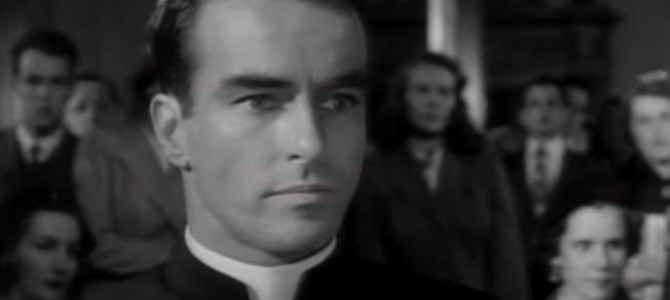
Dead actors rise out of old film cans to remind us who we once were. Alfred Hitchock’s “I Confess” was released in 1953. A flawed gem, the movie could hardly be made today.
Who would be its audience? In these times of extravagant mercifying, the film would likely resonate, even among Catholics, as simply a trademark suspense drama that hinges on the seal of the confessional.
Eric Rohmer called “I Confess” “a modern masterpiece,” not only for its cinematic intelligence and deft thriller-craft, but for the gravity that animated it. Montgomery Clift, Ann Baxter, Karl Malden, and German actor O.E. Hasse resurrect a culture still mindful of basic themes of Judeo-Christian life: the dogged weight of sin, and the urgency of repentance.
Mortifying the ego, crucial to the penitential spirit, offends a psychologized culture that fobs personal wrongdoing onto scapegoats. Poverty, politics, environment, social structure, the blameless unconscious—all of it sidles into the dock to stand bail for individual responsibility. By contrast, the power of the keys confirms the very personal nature of sin. And the curtained confessional stands as the emblem of a moral universe remote from the temper of our time.
A Lost Paradigm for Personal Responsibility
A life-long Catholic, Hitchcock filmed his morality tale in Quebec. The Catholic Church’s ascetic and spiritual practices were on the cusp of decline in the early 1950s, but Quebec still claimed a coherent religious culture. It had not yet yielded to the times. Participation in the Sacrament of Penance—as it was then called—was still a barometer of moral consciousness.
Among the observant, a confessor’s ears are God’s ears. The priest may never speak of what God has heard through him. He may not refuse to hear a confession. Neither is he even permitted to reveal that a particular individual ever entered the confessional, no matter the cost to his own life or reputation. Every confessor, then, is at the mercy of the penitent. The seal makes a cunning plot device.
The action of “I Confess” pivots on that note. Father Logan (Clift) represents the moral order, violated by a murder moments ago. Otto Keller (Hasse), a refugee befriended by Logan, slips into church late one night asking to make his confession. He has just killed a man in an attempted theft gone bad. Murder cries out for penance greater than a few obligatory Hail Marys. Divine mercy does not abolish divine justice. If his contrition is sincere, Keller must at least put the money back.
Refusing to Confess Means Doubling Down on Evil
In the confessional box, a penitent is his own judge and prosecutor. But psychological man demands absolution on his own terms. Keller makes excuses: life is hard for refugees (“a man without a country, alone”). He meant only to steal, not to kill. He needed the money so his wife—ruining her hands charring—will not have to work so hard. He cannot put the money back without exposing himself. Why bother—the owner is dead. And to turn himself in would be intolerable.
Fr. Logan is indifferent to his litany. The killer’s rebellion against penance smolders into malice. He connives to frame his confessor. Plot and subplot intertwine in Hitchcockian fashion to entrap the innocent priest.
Suddenly, Keller’s conscience-stricken wife blurts out the priest’s innocence. She had known the truth all along; her silence, a parallel to Logan’s. But where his silence was an act of virtue, hers was a sin by omission. Maddened by fear of discovery, Keller shoots her to keep her quiet. She dies asking for Logan’s forgiveness.
Like Cain, Keller can find no rest. His sins have found him out, propelling him toward a defiant crescendo of violence. The staginess of his death is pure Hitchcock, but the moral twilight he has entered is real. He cannot shoot his way out of it but, instead, is killed trying. His dying whisper to the man he would have destroyed is “Forgive.” Logan closes Keller’s eyes with the ancient formula: “Ego te absolvo.” It was the consummate gift.

Absolving the Guilty, Blaming the Innocent
We are not in Quebec of the 1950s any more. Could a Fr. Logan be portrayed sympathetically today? Or would insistence on penance mark him as an authoritarian representative of an outmoded patriarchal order? Could his moral demands be seen as contributing to Keller’s disintegration? Might Keller’s refugee status mitigate his crime?
Answers are all around us. Cues to the impoverishment of any traditional sense of individual accountability arrive daily with the news. A few examples.
When a “refugee” stabbed to death a 22-year-old Swedish social worker in an asylum center in January, the commissioner of police welled with sympathy for the murderer:
Well, you are of course distraught on behalf of everyone involved. Naturally, for the person killed and her family, but also for a lone young boy who commits such a heinous incident. What has that person been through? Under what circumstances has he grown up? What is the trauma he carries? This entire migration crisis shows how unfair life is in many parts of the world. We have to try to help solve this best we can.
A second Swedish official implicated overcrowding in the center as a plausible element in the killing.
U.N. Secretary General Ban Ki-moon absolved last month’s murder of a young Israeli woman by two Palestinian students—pipe-bomb makers—with a statement that it is “human nature to react to the occupation, which often serves as a potent incubator of hate and extremism.” Politics and human nature, pious alibis, transfer fault from the guilty to the innocent.
Norwegian bureaucrats determined that rape by refugees is strictly a cultural custom, like gorging on haggis or bull running. Remedial lessons will fix it. In December, Andrew Higgins reported in the New York Times:
Henry Ove Berg, who was Stavanger’s police chief during the spike in rape cases, said he supported providing migrants sex education because ‘people from some parts of the world have never seen a girl in a miniskirt, only in a burqa.’ When they get to Norway, he added, ‘something happens in their heads.’
In their heads is an awareness of themselves as a subjugating force. These are not supplicants. They are behaving as conquering armies do, raping. But Berg, his imagination wiped clean of the seven deadlies—wrath and envy chief among them—brims with distorted largesse.
An Iraqi migrant raped a ten-year boy in a swimming pool in Vienna. His defended himself with Western psychologizing. He was at the mercy of a “sexual emergency.” Without sex for four months, he suffered from “an excess of sexual energy.” Alert to the leanings of the culture he trespassed against, he confessed to “a mistake.” There was no need to call his sin by its right name.
Substituting Spectacle for Sacrament
Prevailing culture lulls us from viewing ourselves as agents of our own moral predicaments. Rather, we are victims of difficult situations. Pope Francis’ promiscuous hawking of mercy, disconnected from acknowledgment of personal sin, epitomizes the modern inversion: “I see the church as a field hospital after battle. It is useless to ask a seriously injured person if he has high cholesterol and about the level of his blood sugars. You have to heal his wounds. Then we can talk about everything else.”
Small wonder that parish priests report an steeper drop in confessions on Francis’ watch. Under this flexible dispensation, the word sinful is out, injured is in. Palliative theatre jostles aside the old confessional box and the symbol system it sustained. Philip Rieff, writing “The Triumph of the Therapeutic” in 1966, saw it coming:
At the breaking point, a culture can no longer maintain itself as an established span of moral demands. Its jurisdiction contracts; it demands less, permits more. Bread and circuses become confused with right and duty. Spectacle becomes a functional substitute for sacrament.
Spectacle displaces cultural memory and substitutes, also, for a society’s ability to function on its own behalf. A people who have abandoned a sense of sin are incapable of responding adequately when they are sinned against. Instead, they extend even to their enemies the remissions they offer themselves.









